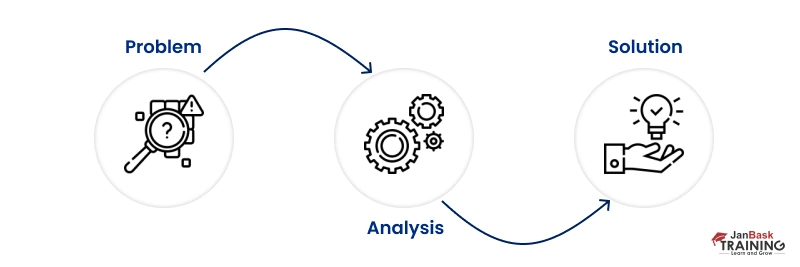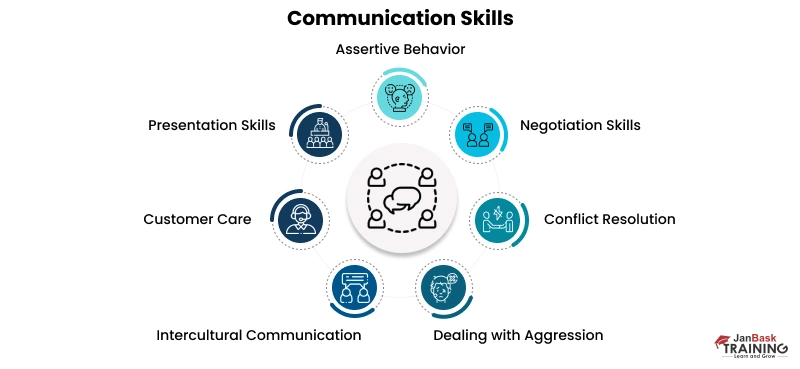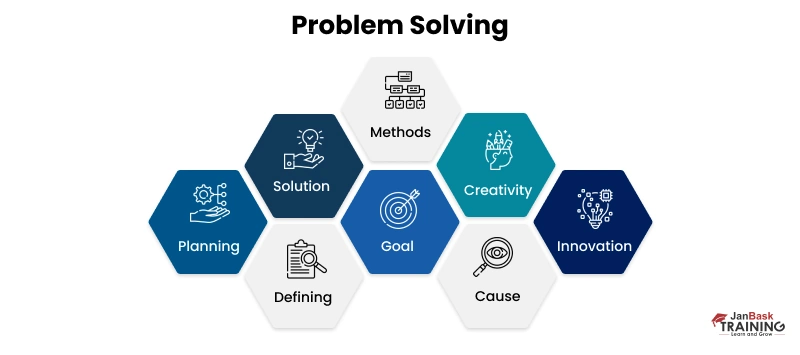Introduction
Today’s bustling modern business landscape makes data a lifeline of decision-making and success. Business analytics here serves as a gateway to understanding data-driven decision-making processes. This has increased the demand for skilled business analyst professionals to harness the data power and reach unprecedented heights.
Students with creative outlooks and basic programming knowledge can choose business analysis as their career choice. According to the Harvard Business Review, the Business Analyst profile has consistently ranked among the top 10 careers in the United States in recent years, with a projected growth rate of 14% in 2025.
Yes, a business analyst is one of the thriving job profiles with a brighter future. If this profession fascinates you or your youngsters, consider reading the whole blog and understand the intricacies of the business analytics syllabus. We have covered everything from benefits to business analytics subjects.
So, read, know business analyst online course options, and decide. Now, let’s start this reading ride and find the business analytics syllabus you need to know before stepping ahead into this field.
Business Analyst Training & Certification
- Detailed Coverage
- Best-in-class Content
- Prepared by Industry leaders
- Latest Technology Covered
What Does Business Analyst Training Include?
When you start training, knowing everything about the training is better. We also want our readers to know well about the business analyst course and what its training will include. Let us tell you clearly that its training is about more than just mastering data analysis techniques. It's more than that.
The training includes learning a holistic problem-solving, decision-making, and optimization approach. These courses typically cover a wide range of topics to provide a comprehensive skill set to the participants. Let's delve deeper into the business analyst course syllabus and subjects:
Know the complete business analytics syllabus
1. Introduction to Business Analysis:
- Role and responsibilities of a business analyst.
- The importance of data-driven decision-making in contemporary business.
2. Data Analysis Fundamentals:
- Data collection, cleaning, and validation.
- Exploratory data analysis techniques.
3. Business Process Analysis:
- Modeling and mapping of existing business processes.
- Identifying bottlenecks and inefficiencies.
4. Requirements Elicitation and Documentation:
- Gather and document business requirements.
- Techniques for effective communication with stakeholders.
5. Data Visualization and Reporting:
- Tools and best practices for creating insightful data visualizations.
- Crafting meaningful reports and dashboards.
6. Statistical Analysis
- Descriptive and inferential statistics.
- Hypothesis testing and regression analysis.
7. Database Management
- Basics of database systems.
- Structured Query Language (SQL) for data retrieval and manipulation.
8. Business Intelligence Tools
- Introduction to BI tools like Tableau, Power BI, and QlikView.
- Building interactive dashboards.
9. Project Management for Business Analysts
- Project planning and execution.
- Agile and Scrum methodologies.
10. Case Studies and Practical Projects:
- Applying learned concepts to real-world scenarios.
- Problem-solving through data analysis.
List of Business Analyst Course Subjects
A typical business analyst course encompasses various subjects, including but not limited to:
- Business Analysis Methodologies
- Stakeholder Analysis and Management
- Process Improvement Techniques
- Critical Data Mining Techniques and Predictive Analytics
- Business Ethics and Compliance
- Change Management
- Business Communication Skills
- Risk Assessment and Management
- Quality Assurance and Testing
Experts have structured the business analytics curriculum with an essential business analytics syllabus that ensures all participants acquire a balanced skill set. The course combines theoretical knowledge with hands-on experience through practical exercises and projects.
So, the business analytics syllabus is dynamic and evolves with industry trends and technological advancements. It is designed to equip participants with the latest tools and techniques in data analysis, ensuring that they remain competitive in the job market.
What Are The Top Benefits of Studying a Business Analytics Course?
In the business analytics syllabus, students study wide range of topics such as data analysis, statistical analysis, data visualization, and tools like Excel, SQL, and more. Whether you're a seasoned professional or a newcomer to the field, BA course offers valuable benefits to enhance your career prospects.
1. Skill Enhancement
As mentioned above too, business analyst course focuses on data analysis, problem-solving, and critical thinking. These skills enable individuals to gather, analyze, and interpret data, solve complex business problems, and make informed decisions. Effective communication with stakeholders and precise documentation of requirements and processes are emphasized. The course also covers tools, Agile, and domain-specific knowledge.
This skill enhancement equips individuals to bridge the gap between business needs and technology solutions, contributing significantly to project success and career advancement. Check out the top skills of a business analyst one must possess.
2. Career Advancement
The next benefit of enrolling in a business analyst certification online is career advancement. These educational opportunities help you propel your professional journey forward by providing you with the knowledge and recognition needed to excel in the field.
Acquiring a business analyst certification online enhances your credibility as a skilled professional. Companies often prioritize certified candidates, considering them more capable and committed resources. This credibility gives you a competitive edge in the job market, increasing your chances of securing desired positions.
Additionally, learning a BA training online broadens your career horizons. Because business analysts are in demand across various industries, including finance, healthcare, and IT. The certification can open doors to diverse job opportunities, allowing you to explore different sectors and roles and making your career secure in the coming years.
3. Industry Relevance
The business analysis and analytics world constantly evolves, driven by technological advancements and changing business landscapes. Enrolling in a Business Analytics course or pursuing a Business Analyst certification makes you a strong resource for companies in this dynamic market.
There are many important subjects included in the course. Experts have framed the latest business analytics course subjects by considering all the major areas. It includes data analysis, statistical modeling, machine learning, and data visualization. These are core areas of expertise that are in high demand across industries. By mastering these business analytics subjects, you gain skills directly applicable to real-world business challenges.
Studying a business analyst course today positions you as an industry expert in the market. You can access various exciting career opportunities in finance, healthcare, and marketing. Therefore, business analyst certification equips you with the latest knowledge and skills, making you a sought-after professional in a rapidly evolving field.
Business Analyst Training & Certification
- No cost for a Demo Class
- Industry Expert as your Trainer
- Available as per your schedule
- Customer Support Available
4. Job Security
Job security has become a significant challenge after the pandemic, especially in the recent recession. Choosing a business analyst profile seems a safer and brighter option. Those who have just completed a business analyst certification online, or undergone BA training should go for this profile because it seems safe compared to others.
The demand for business analysts has increased in recent years and is projected to continue. The US Bureau of Labor Statistics (BLS) projects job growth between 2020 and 2030 for similar roles to range from seven percent to 25 percent.
Business analysts are in high demand across industries due to their unique skill set, which includes data analysis, requirements gathering, and problem-solving. This demand ensures a consistent need for professionals with these capabilities, translating into job security.
5. Lucrative Salary
According to Glassdoor, the entry-level salary of a business analyst ranges between $82k–130k per year. After a few years of experience, you get promoted to a senior business analyst with an average salary range of $101,000 to $149,000. Eventually, you become a seasoned business analyst and earn the title of director of business with an average salary range of $205,000 to $367,000.
Additionally, business analysts possess versatile skills that can be applied in various sectors, such as finance, healthcare, IT, and marketing. This adaptability means your skills remain relevant and transferable to other sectors, even if one industry faces challenges.
Investing in continuous learning by enrolling in a Business Analyst online course or pursuing BA training focusing on the business analytics syllabus demonstrates your commitment to staying updated with industry trends and best practices. This commitment enhances your value to organizations and contributes to long-term job security. Gain in-depth knowledge about business analyst certification to secure your future.
What Are The Top Skills Required to Become a Business Analyst Professional, and Who Can Study This Course?
Now, we hope you all understand why one should pursue a career as a business analyst. Business analysts possess a unique blend of analytical, communication, and problem-solving skills, making them valuable assets in various industries. So, it’s time to dig into the skills required to become one.
Let’s understand these skills first and then start your research for the course and business analytics syllabus
1. Analytical Skills

Analytical skills are essential for business analysts. They involve interpreting data, thinking critically, and solving complex problems. Business analysts use these skills to analyze data, identify patterns, and draw meaningful conclusions. They also employ critical thinking to assess situations objectively and make informed decisions.
Problem-solving is another crucial aspect, allowing them to break down intricate problems into manageable parts and develop practical solutions. Quantitative analysis often evaluates data, such as financial metrics, supporting decision-making.
Additionally, business analysts use data visualization techniques to present information through charts and graphs. Suppose you're interested in becoming a business analyst. In that case, you can enhance your analytical skills through online courses and certifications, such as business analyst certification online programs or comprehensive BA training courses. These programs provide the knowledge and skills needed to excel in business analysis.
2. Communication Skills

Communication skills are paramount for all of us and the same goes for aspiring business analysts. They encompass the ability to convey ideas, gather requirements, and present findings effectively. Business analysts must excel in both written and verbal communication. Written communication involves documenting requirements, process flows, and project plans clearly and comprehensively.
Verbal communication is crucial for conducting interviews, facilitating meetings, and ensuring stakeholders understand project objectives. Additionally, active listening is essential to grasp stakeholders' needs accurately.
As mentioned many times, the business analyst's syllabus include data analysis, statistical methods, predictive modeling, and data visualization. It may cover business process modelling, requirements gathering, and project management. These subjects equip future analysts with the necessary skills to analyze data, make informed decisions, and communicate their findings effectively to support business objectives. Developing strong communication skills alongside a robust understanding of business analytics subjects becomes more helpful in succeeding as a business analyst.
3. Problem Solving Skills

Problem-solving skills are fundamental for individuals aspiring to become successful business analysts. These skills involve the ability to tackle complex and multifaceted business challenges effectively. Business analysts employ a structured problem-solving approach, including:
- Problem Identification: Recognizing and defining the core issues or opportunities within a business context.
- Data Analysis: Gathering and analyzing relevant data to gain insights into the problem.
- Root Cause Analysis: Identifying the underlying causes of the problem rather than just addressing symptoms.
- Solution Generation: Developing innovative and practical solutions to address the identified issues.
- Stakeholder Collaboration: Engaging with stakeholders to gather diverse perspectives and validate potential solutions.
- Implementation Planning: Creating actionable plans to implement proposed solutions and monitor their effectiveness.
4. Technical Skills

The following valuable component of a business analyst's skill set is a technical skill that enhances their ability to excel in the role. These skills encompass proficiency in various tools, software, and technologies relevant to data analysis and business processes. Business analysts often require technical skills in areas such as:
- Data Analysis Tools: Proficiency in tools like Microsoft Excel, SQL databases, and data visualization software (e.g., Tableau or Power BI) is essential for data manipulation and analysis.
- Business Process Modeling: Knowledge of process modeling tools like BPMN (Business Process Model and Notation) or flowchart software aids in documenting and improving business processes.
- Requirements Gathering Tools: Familiarity with tools like JIRA or Confluence can help capture and manage project requirements efficiently.
- Statistical Software: Understanding statistical software like R or Python can be valuable for advanced data analysis and predictive modeling.
- Project Management Tools: Knowledge of project management tools like Microsoft Project or Trello can help manage tasks and timelines.
Many business analyst certification programs are available online today. You can enroll in specialized online courses and get hands-on experience with the tools and technologies relevant to the field.
5. Documentation Skills
Adequate documentation is fundamental for business analysts. These skills involve effectively recording, organizing, and communicating information, which is essential for project success. Business analysts apply documentation skills in various ways, including capturing detailed requirements from stakeholders, documenting business processes, creating project plans, generating reports and presentations, and producing user manuals.
Clear and concise documentation serves as a crucial tool for communication among project stakeholders, reducing misunderstandings and providing valuable references throughout a project's lifecycle. Learning these skills through relevant business analyst training or courses can further empower analysts.
Business Analyst Training & Certification
- Personalized Free Consultation
- Access to Our Learning Management System
- Access to Our Course Curriculum
- Be a Part of Our Free Demo Class
Top Certifications Available for Business Analyst
Many business analyst certification online programs are available today. Investing in these certifications and relevant training can open up new opportunities, enhance your skillset, and strengthen your position as a proficient business analyst in the ever-evolving business landscape.
Here’s a list of popular courses you can consider per your expertise:
Certification
|
Overview
|
|
Business Analyst Master
|
The Business Analyst Master certification provides comprehensive training in business analysis, covering a wide range of skills and techniques essential for success. This certification equips professionals with the knowledge and expertise to excel in business analysis roles. This certification is a valuable choice to enhance your career prospects and credibility as a business analyst. You can find business analyst certification online programs offering this credential.
|
|
Project Management Professional (PMP)
|
A globally recognized certification for project management professionals. While not exclusive to business analysts, it enhances their project management skills, a crucial aspect of their role. Business analysts often collaborate closely with project managers, and this certification can improve their ability to contribute effectively to project success. You can explore online PMP courses to prepare for this certification.
|
|
Six Sigma
|
Six Sigma certification focuses on process improvement and data-driven decision-making. Business analysts can benefit from Six Sigma training as it complements their analytical skills and helps them identify and eliminate inefficiencies in business processes. Look for courses that offer Six Sigma certification to enhance your skill set.
|
|
Scrum Master
|
Scrum is a popular Agile framework used in project management. Becoming a Scrum Master can be valuable for business analysts working in agile environments. This certification enables professionals to facilitate Agile teams and processes effectively. Explore Scrum Master certification courses to build expertise in Agile methodologies.
|
Conclusion
The ever-increasing importance of data-driven decision-making in today's business landscape makes business analysts indispensable. Their unique blend of analytical, communication, problem-solving, and technical skills positions them as valuable assets across various industries.
If you're looking to embark on a promising career as a business analyst or advance your existing one, consider enrolling in an online business analyst certification program today. Our blog has given you a glimpse of the business analytics syllabus and the skills you need in this data-driven world. So, equip yourself with the skills and knowledge needed to secure a brighter future in business analysis.
FAQs
Q1- What is a business analyst certification, and why should I consider getting one?
Ans- A business analyst certification validates your expertise in business analysis. It enhances your career prospects by demonstrating your skills and knowledge to potential employers.
Q2- Are there different types of business analyst certifications, and how do I choose the right one?
Ans- There are various business analyst certifications, such as Business Analyst Master, PMP, Six Sigma, and Scrum Master. To choose the right one, consider your career goals, industry focus, and the skills you want to develop.
Q3- Can I pursue a business analyst certification online, and how long does it typically take to complete?
Ans- Yes, many business analyst certifications offer online programs. The duration varies depending on the certification and your pace of learning, but most can be completed within a few months to a year.
Q4- What are the prerequisites for enrolling in a business analyst certification program?
Ans- Prerequisites can vary, but a basic understanding of business concepts and related work experience can be beneficial. Each certification program may have its specific requirements.
Q5- Do I need a background in IT to become a business analyst and pursue certification?
Ans- While IT experience can be valuable, it's not always required. Business analysts come from diverse backgrounds, including business, finance, and other fields. Certification programs often cover a broad range of topics.
Q6- Are business analyst certifications recognized globally, and will they help me find a job internationally?
Ans- Many business analyst certifications are recognized worldwide and can enhance your job prospects internationally. They demonstrate your proficiency and commitment to the field.
Q7- What is the cost of obtaining a business analyst certification, and are there any financial aid options available?
Ans- Certification costs vary, with some being more affordable than others. Some organizations offer scholarships or financial aid to help cover certification expenses.
Business Analyst Course
Upcoming Batches
Trending Courses
Cyber Security
- Introduction to cybersecurity
- Cryptography and Secure Communication
- Cloud Computing Architectural Framework
- Security Architectures and Models
Upcoming Class
1 day 03 Jul 2025
QA
- Introduction and Software Testing
- Software Test Life Cycle
- Automation Testing and API Testing
- Selenium framework development using Testing
Upcoming Class
2 days 04 Jul 2025
Salesforce
- Salesforce Configuration Introduction
- Security & Automation Process
- Sales & Service Cloud
- Apex Programming, SOQL & SOSL
Upcoming Class
1 day 03 Jul 2025
Business Analyst
- BA & Stakeholders Overview
- BPMN, Requirement Elicitation
- BA Tools & Design Documents
- Enterprise Analysis, Agile & Scrum
Upcoming Class
9 days 11 Jul 2025
MS SQL Server
- Introduction & Database Query
- Programming, Indexes & System Functions
- SSIS Package Development Procedures
- SSRS Report Design
Upcoming Class
9 days 11 Jul 2025
Data Science
- Data Science Introduction
- Hadoop and Spark Overview
- Python & Intro to R Programming
- Machine Learning
Upcoming Class
2 days 04 Jul 2025
DevOps
- Intro to DevOps
- GIT and Maven
- Jenkins & Ansible
- Docker and Cloud Computing
Upcoming Class
8 days 10 Jul 2025
Hadoop
- Architecture, HDFS & MapReduce
- Unix Shell & Apache Pig Installation
- HIVE Installation & User-Defined Functions
- SQOOP & Hbase Installation
Upcoming Class
2 days 04 Jul 2025
Python
- Features of Python
- Python Editors and IDEs
- Data types and Variables
- Python File Operation
Upcoming Class
17 days 19 Jul 2025
Artificial Intelligence
- Components of AI
- Categories of Machine Learning
- Recurrent Neural Networks
- Recurrent Neural Networks
Upcoming Class
16 days 18 Jul 2025
Machine Learning
- Introduction to Machine Learning & Python
- Machine Learning: Supervised Learning
- Machine Learning: Unsupervised Learning
Upcoming Class
23 days 25 Jul 2025
Tableau
- Introduction to Tableau Desktop
- Data Transformation Methods
- Configuring tableau server
- Integration with R & Hadoop
Upcoming Class
3 days 05 Jul 2025





























